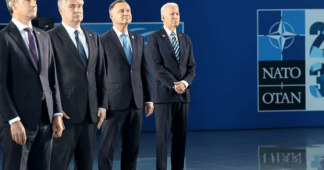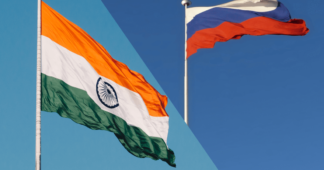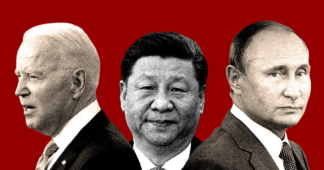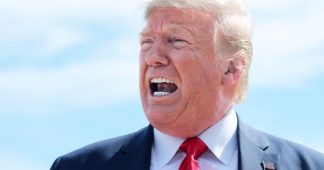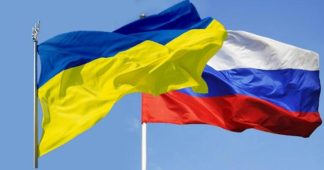By Anuradha Chenoy (*)
The Global South has new agency in a changing world, with several countries finding that neutrality and strategic autonomy have become a viable option
The international system is witnessing geopolitical changes and a push for competitive great power hegemony. The United States leads with its goal for primacy in the international system. The U.S.’s national security documents advocate curbing China’s rise, weakening Russia’s capabilities, securing Europe behind U.S. leadership and building satellite alliances with countries which conform to U.S. interests and values. But other players have different agendas and the Global South matters more than before.
China is the ‘near peer’, but in reality is no match to the U.S. militarily. Given its phenomenal economic reach that widened during globalisation, China began building counter institutions. It looked for accommodation with the U.S. in its ‘peaceful rise’ project. As the U.S. found this unacceptable, China turned from partner to competitor to threat.
Experiences with the West as a factor
Russia with its vast natural resources and military capability has shown capacity to assert its will in global geopolitics. Russian aggression in Ukraine confirms the view of U.S. strategists that they would like to weaken Russian capabilities. Further they see Russia especially when in alliance with China or any other country as dangerous US geopolitics. Russian aggression on Ukraine and the terrible war of attrition has been a geopolitical watershed. The U.S. is using this conjuncture for global primacy. Europe is now firmly behind the U.S.’s strategic plans and is re-militarising. The developing Sino-Russian strategic partnership ‘without limits’ is the clearly defined enemy other for the West. So, the only speed breaker is the Global South.
Countries of the Global South, especially India, China and others, are being blamed for the failing sanctions against Russia in the context of the Ukraine war. The Global South, with a few exceptions wants a quick and negotiated end to this war; all (except seven) oppose the sanctions regime and all advocate neutrality.
The reasons for neutrality include: the needs for regime survival especially because many in the South are dependent on Russian energy, fuel, fertilizers, wheat, commodities and defence equipment. They have memories of colonialism and recent interventions such as Iraq (2003), Lebanon (1982, 2006), Libya (2011), Afghanistan (2001-21), Yemen (2010-on) Syria (supporting Jordan), Mali, etc.
Recent experiences such as the refusal by the West to grant a one-time exception for patents for the COVID-19 vaccine have not helped either. Media images of the way refugees from the South are treated in contrast to the welcome to Ukrainian refugees have revealed the unsurprising racism. Many countries of the South believe that they are unlikely to get western help when they need it the most. In such circumstances Russia is not seen as a threat in the Global South.
China marches on
China’s expanding military footprint is problematic for many countries in Asia. China’s ‘grey zone’ policies — of creeping expansionism, violation of maritime zones in the South China Seas and elsewhere — have antagonised several countries which include Vietnam, Indonesia, India and the Philippines. But even then, most of these Southern countries would not like to be a part of security or military alliances with either the West or the Russian or Chinese sides. For example, the security pact that China (May 2022) offered to 10 Pacific island nations did not find favour with them (the Solomon Islands, Kiribati, Samoa, Fiji, Tonga, Vanuatu, and Papua New Guinea, the Cook Islands, Niue, and the Federated States of Micronesia). They also did not agree to China’s ‘Common Development Vision’.
The U.S. response to this neutrality has been to put massive pressure for sanctions on Russia and build threat narratives about China. But there has been an unprecedented pushback from the South that wants to make its own strategic choices. For example, the U.S. Congress recently passed a bill — “Countering Malign Russian Activities in Africa Act” — that advocates pressuring, monitoring, and punishing African states and leaders who engage with Russia. In response, the South African Foreign Minister Naledi Pandor in a press conference — U.S. Secretary of State Antony J. Blinken was present — said no African country could be bullied and described this U.S. Bill as “offensive legislation”. Ms. Pandor called for diplomacy and urged: “African countries that wish to relate to China, let them do so, in whatever the particular form of relationship of their choice. (August 22, 2022). She also reminded Mr. Blinken of the plight of Palestine under occupation.
On its part, China is waiving debt owed by 17 African countries (for 23 interest-free loans that were due in 2021) — as India did in 2003. There have been similar pushbacks from Latin America and the West Asian Countries. Of course regional powers also work with the U.S. to project their own power — for example Saudi Arabia vis-à-vis Iran. Smaller states do a balancing act between regional powers — as Sri Lanka does between India and China.
Stronger countries of the Global South such as India have used their leverage to negotiate with multiple sides. India increased oil purchases from Russia, shrugging off western pressure. India has a military Logistics Exchange Memorandum of Agreement (LEMOA) with the U.S.; at the same time it has developed the International North South Transport Corridor connecting Russia and India via central Asia and Iran with three sanctioned states. It participates in military exercises such as the U.S.-led RIMPAC (the Rim of the Pacific Exercise, and one of the world’s largest maritime exercises) but also sends a military contingent for the Vostok exercises (one of exercises Moscow routinely conducts) with Russia and China. So, India, Vietnam, Indonesia, Malaysia, Turkey and others have developed the capacity to transact with competing and conflicting sides.
Moving to geoeconomics
The South’s choices are extending slowly to geoeconomics. The fear of the U.S. strategy of freezing dollar reserves has made the South cautious. Further, there is the U.S. Treasury Secretary Janet Yellen’s recent announcement about U.S. trade policies of ‘re-shoring’ and ‘friend-shoring’ — meaning trade between allies. This is leading the South to gradually find ways of bypassing the dollar in bilateral trade by using local currencies. Currency swap arrangements are used by China and ASEAN + 3 countries; India with Russia and 23 other countries. This does not mean the end of dollar dominance, but alternate paths are opening up for them.
In sum, the Global South has new agency. Multilateral institutions, ranging from BRICS (Brazil, Russia, India, China and South Africa) and the African Union, to the Association of Southeast Asian Nations (ASEAN), The Community of Latin American and Caribbean States, have given it new confidence. Several countries including India, Brazil, South Africa, Indonesia and Malaysia have become economic powerhouses, albeit with their own inequalities and domestic problems. In these circumstances, neutrality and strategic autonomy have become a viable though not a normative option.
The Global South has made a statement on its development, for better terms for trade for which they need strategic autonomy. If the Global South were to voice collective concerns on existential threats from climate change, ecological devastation, inequalities and increasing militarisation, and work in plural inclusive ways, it could make the world a better place for itself
(*) Adjunct Professor at the Jindal Global University and former Dean, School of International Studies, Jawaharlal Nehru University
We remind our readers that publication of articles on our site does not mean that we agree with what is written. Our policy is to publish anything which we consider of interest, so as to assist our readers in forming their opinions. Sometimes we even publish articles with which we totally disagree, since we believe it is important for our readers to be informed on as wide a spectrum of views as possible.
